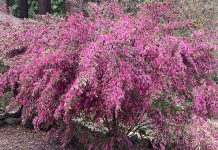It’s always a breathtaking experience taking a walk at this time of year. You might see the cobalt blue flowers of ceanothus or a stand of dicentra formosa with their dainty pink bell-shaped flowers backlit in the spring sunlight. Coral bells are in full bloom as are the Pacific Coast iris. These are just a few of our local native plants. Everywhere you look nature is beginning the season fresh with anticipation and promise.
California is a vast domain when it comes to natural features and different soils. From hills and mountains to deserts, valleys and ocean bluffs, there are 6,000-plus plant species within our borders. Hundreds of these are showy and useful plants worthy of cultivation in our garden. Some, like ceanothus, have already been cultivated for a century or more, both here and abroad.
There are features of the California landscape that present a certain flavor and seasonal progression, quite distinct from that of the subtropics and year-round, moist forests that many traditional garden plants come from. Plants of hilly and mountainous areas are often found in rocky or sandy soils and require well-drained garden soils. Many plants of the chaparral have poor resistance to the root pathogens that thrive in a warm, moist soil and may not tolerate typical garden style irrigation in summer.
Matching or creating the right conditions is the key to success to grow California natives. Planting on a raised mound or berm, for instance, is one way to drain water away from sensitive crowns. Knowing where in California a given native plant comes from can help you make the right decisions.
That being said, there are many natives with an amazing broad tolerance of different conditions. Toyon (Heteromeles arbutifolia) grows in both sandy and clay soils as does yarrow (Achillea millifolium) which is also a good cut flower. Carex grass and Seaside daisy (Erigeron glaucus) also do well in most soils.
If you garden in clay soils, good native shrubs are Western redbud, manzanita, spicebush, bush anemone, ceanothus, garrya, Pacific wax myrtle, Western mock orange, blue elderberry, mahonia, California wild rose and snowberry. Native perennials for clay soil include coral bells, sticky monkeyflower (a good cut flower), salvias, deer grass, rubus and Dutchman’s pipe vine.
Sandy conditions require California natives that are decidedly drought tolerant. You may already grow many of our manzanitas and ceanothus. But do you also have lupine, lavatera, coffeeberry, buckwheat, fuchsia-flowering gooseberry, purple sage, wallflower or the beautiful Douglas iris?
Then there are the folks that live in the shade. Native plants from canyons and riparian areas will do well in your garden. They require some summer watering but that’s all. Native shrubs that tolerate bright shade are manzanita, spicebush, bush anemone, ceanothus, mahonia, Pacific wax myrtle, any of the ribes, wild rose, snowberry and huckleberry. Perennials for color are columbine, Western bleeding heart, California fuchsia, Douglas iris and coral bells.
Where ever you garden, to provide food, nectar or berries for our winged friends be sure you have some flowering currant, sticky monkey flower, coffeeberry, salvia clevelandii, Dutchman’s pipe vine, wax myrtle, California fuchsia, aster chilensis.
Jan Nelson, a landscape designer and California-certified nursery professional, will answer questions about gardening in the Santa Cruz Mountains. Email her at ja******@*ol.com, or visit jannelsonlandscapedesign.com.













